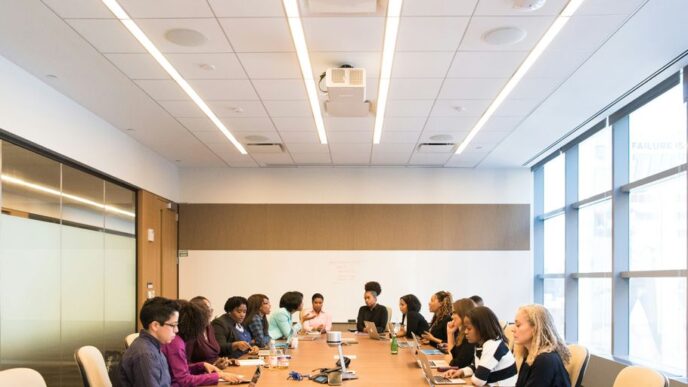Getting ready for your citizenship interview can feel like a big deal, and honestly, it is. But don’t worry, it’s totally doable! This guide is here to walk you through everything, making sure you feel ready and confident for every step. We’ll cover what happens, how to study, and even what to do after the interview. Let’s get you ready to ace this thing!
Key Takeaways
- Know the citizenship interview process inside and out. This means understanding the steps, what they’ll ask, and how the day will go.
- Get good at the civics test. Study American history, government, and civics questions. Have a plan for how you’ll learn it all.
- Practice your English skills. Work on reading, writing, and speaking. You need to understand and be understood.
- Have all your papers ready. Collect every form and document you need. Keep them organized so you can find things fast.
- Learn how to avoid common problems. Don’t fall for bad info, practice answering tough questions, and stay calm no matter what.
Understanding the Citizenship Interview Process
The citizenship interview can feel like a big deal, and it is! It’s a key step in becoming a U.S. citizen. This section breaks down what you can expect during the interview process, from start to finish. We’ll cover the different parts of the interview, what to bring, and how to prepare so you feel confident and ready.
Navigating the Initial Stages
So, you’ve sent in your application – now what? The first step is getting that interview appointment notice. Make sure your address is up-to-date with USCIS, because that’s how they’ll contact you. Once you get the notice, read it carefully! It’ll tell you where to go, when to be there, and what documents to bring. If you need to reschedule, do it ASAP, following the instructions on the notice. Don’t just skip it! Here’s a quick checklist:
- Confirm your appointment date and time.
- Gather all required documents (more on that later!).
- Plan your route to the USCIS office – factor in traffic and parking.
Key Components of the Interview
The interview itself usually has a few main parts. First, the officer will confirm your identity and review your application to make sure everything is still accurate. They might ask you about any changes since you applied, like a new job or address. Then comes the civics test and the English test. The civics test is where they ask you questions about U.S. history and government. The English test checks your reading, writing, and speaking skills. You might be asked to read a sentence aloud or write one down. Preparing for the citizenship evaluation is key to success.
What to Expect on Interview Day
Okay, it’s interview day! Dress professionally – it shows respect. Arrive early to give yourself time to go through security. When you meet the officer, be polite and listen carefully to their questions. Answer honestly and clearly. If you don’t understand something, ask them to repeat it. Don’t rush! Take your time and think before you speak. Remember to bring all your travel documents and any other items requested in your interview notice. After the interview, the officer might tell you their decision right away, or they might need more time to review your case. Either way, they’ll let you know what the next steps are. Understanding your citizenship outcome is important for planning ahead.
Mastering the Civics Test
Okay, so the civics test. It’s a big part of the citizenship interview, and honestly, it can feel a little intimidating. But don’t worry! With the right approach, you can totally nail it. It’s all about knowing your stuff when it comes to American history and how the government works. Let’s break it down.
Essential American History Questions
American history is vast, but the civics test focuses on key events and figures. You don’t need to memorize every single date, but you should have a solid understanding of the major milestones. Think about the Revolutionary War, the Civil War, and the Civil Rights Movement. Knowing the ‘why’ behind these events is just as important as knowing the ‘what’.
Here’s a quick rundown of some areas to focus on:
- The Founding Fathers: Who were they, and what did they do?
- The Constitution: What are its main principles?
- Important wars: What were the causes and outcomes?
- Key amendments: What rights do they protect?
Understanding U.S. Government and Civics
This section is all about how the U.S. government functions. You’ll need to know the different branches of government, what they do, and how they interact with each other. It’s also important to understand the rights and responsibilities of citizens. For example, you should know about voting, paying taxes, and serving on a jury. Understanding American visa requirements is also helpful for context.
Here are some key topics:
- Branches of government: Executive, Legislative, and Judicial
- The Bill of Rights: What rights are guaranteed?
- The election process: How do we elect our leaders?
- Civic responsibilities: What are our duties as citizens?
Effective Study Strategies for Civics
So, how do you actually prepare for the civics test? Well, rote memorization isn’t always the best approach. Instead, try to understand the concepts and connect them to real-world examples. Here are a few strategies that might help:
- Use flashcards: They’re great for memorizing facts and definitions.
- Watch documentaries: Visual aids can make history more engaging.
- Take practice tests: This will help you identify your weak areas.
- Join a study group: Discussing the material with others can deepen your understanding.
Don’t cram! Space out your studying over several weeks or months. This will help you retain the information better. And remember, the goal isn’t just to pass the test, but to become a knowledgeable and engaged citizen.
Excelling in the English Proficiency Exam
Okay, so the English portion of the citizenship interview can feel like a lot. But don’t sweat it too much! It’s really about showing you can communicate effectively. They’re not expecting perfection, just a solid grasp of the language. I remember when my neighbor was studying, she was so stressed about grammar, but honestly, just being able to understand and respond clearly is a big part of it.
Reading Comprehension Skills
This part is pretty straightforward. You’ll likely be asked to read a sentence or two aloud. The key here is to read slowly and clearly. Don’t rush! Focus on pronunciation and understanding the meaning of what you’re reading. If you stumble on a word, don’t panic. Just take a breath and try again. It’s also a good idea to practice reading different types of sentences – simple statements, questions, maybe even a short paragraph. You can find plenty of free resources online for this. For example, you can check out US visa requirements for Estonian citizens to get a sense of the kind of language used in official documents.
Writing Accuracy and Fluency
For the writing part, you’ll probably have to write a sentence dictated by the officer. Again, clarity is key. Listen carefully and write down exactly what you hear. Don’t worry about fancy handwriting; just make sure it’s legible. Pay attention to basic grammar, like capitalization and punctuation. A good tip is to practice writing simple sentences about everyday topics. Think about things like your family, your job, or your hobbies. The more you practice, the more comfortable you’ll become.
Speaking and Listening for Success
This is where a lot of people get nervous, but it’s really just a conversation. The officer will ask you questions about your application and your background. The best thing you can do is listen carefully and answer honestly. Don’t try to use big words or complicated sentences. Just speak clearly and directly. If you don’t understand a question, don’t be afraid to ask the officer to repeat it or rephrase it. Practicing with a friend or family member can really help you get comfortable speaking English in a formal setting. Just chat with them about your life, your plans, and your reasons for wanting to become a citizen. It’s all about building confidence and getting used to speaking English on the spot.
Preparing Your Documentation
Getting your paperwork in order is a big part of the citizenship process. It might seem tedious, but trust me, being organized can save you a ton of stress and potential delays down the road. Think of it as building a solid foundation for your application – the stronger the foundation, the smoother the process.
Gathering Required Forms and Evidence
First things first, you need to know exactly what the government wants. The USCIS website is your best friend here. They have checklists and instructions for every form you need. Don’t just guess! Read everything carefully. For example, if you are applying for Canadian citizenship as an adult, make sure you have the correct application package.
Here’s a quick rundown of some common documents you’ll likely need:
- Form N-400: This is the Application for Naturalization. Fill it out completely and honestly.
- Green Card: A copy of both sides of your permanent resident card.
- Passport Photos: Two identical passport-style photos.
- Marriage Certificate (if applicable): If you’re married to a U.S. citizen, you’ll need this.
- Divorce Decrees (if applicable): If you’ve been divorced, include copies of the divorce decrees.
- Tax Returns: You might need to provide tax returns for the past few years.
- Proof of Residency: Documents showing you’ve lived in your current state for the required amount of time (lease agreements, utility bills, etc.).
Organizing Your Application Packet
Okay, you’ve got all your documents. Now what? Don’t just throw them in a box! Presentation matters. Here’s how to organize your application packet like a pro:
- Follow the USCIS Instructions: They usually specify the order in which they want the documents. Stick to it!
- Use a Binder or Folders: Keep everything neat and tidy. A three-ring binder with dividers works well.
- Make Copies: Always keep a complete copy of everything you send to USCIS. You never know when you might need it.
- Label Everything Clearly: Use labels to identify each document. This makes it easier for the USCIS officer to review your application.
Addressing Potential Document Issues
Sometimes, things aren’t so straightforward. Maybe you’re missing a document, or maybe a document has an error. Don’t panic! Here’s how to handle some common issues:
- Missing Documents: If you can’t find a required document, try to get a certified copy from the issuing agency. If that’s not possible, write a letter explaining why you can’t provide the document and include any alternative evidence you have.
- Errors on Documents: If a document has an error, try to get it corrected by the issuing agency. If that’s not possible, include a letter explaining the error and providing any supporting documentation.
- Translations: If any of your documents are not in English, you’ll need to provide a certified translation. This means the translator must sign a statement certifying that the translation is accurate.
Remember, honesty is always the best policy. If you’re unsure about something, it’s always better to ask for help from an immigration attorney or a qualified legal representative. They can provide guidance and help you avoid costly mistakes. Getting your application process right the first time will save you time and stress in the long run.
Common Pitfalls and How to Avoid Them

Avoiding Misinformation and Delays
It’s easy to get tripped up by bad info floating around online or from well-meaning but misinformed friends and family. Always rely on official USCIS sources for information about the citizenship process. This includes the USCIS website, official publications, and direct communication from USCIS. Using unofficial sources can lead to mistakes on your application or incorrect preparation for the interview, causing delays or even denial. Also, make sure you submit everything they ask for the first time around. Incomplete applications are a huge source of delays.
Handling Challenging Interview Questions
Some questions during the interview might seem tricky or designed to catch you off guard. They’re not! The officer is just trying to assess your understanding and honesty. If you don’t understand a question, ask the officer to rephrase it. Don’t guess! It’s better to admit you don’t know something than to give a wrong answer. Prepare for questions about your background, travel history, and any potential issues that might arise from your application. Think about how you’ll answer honestly and clearly. For example, if you’ve had a brush with the law, be upfront about it and show that you’ve taken steps to correct the situation. You can also prepare for an IELTS exam to improve your English.
Maintaining Composure Under Pressure
The citizenship interview can be nerve-wracking, even if you’re well-prepared. It’s normal to feel anxious, but it’s important to stay calm and focused. Here are a few tips:
- Practice deep breathing exercises to calm your nerves before and during the interview.
- Dress professionally to boost your confidence and show respect for the process.
- Maintain eye contact with the officer and speak clearly and confidently.
- Remember why you’re there – to become a U.S. citizen! This can help you stay motivated and focused.
If you start to feel overwhelmed, take a moment to collect yourself before answering. Don’t be afraid to ask the officer to repeat a question if you need to. The officer wants you to succeed, so try to relax and be yourself. Remember to review the US citizenship test to help you prepare.
Post-Interview Steps and Oath Ceremony
So, you’ve made it through the interview! That’s a huge step. But what happens next? It’s not quite over yet. Let’s break down what to expect after your interview and how to prepare for the big day – the Oath Ceremony.
Understanding Interview Outcomes
After your interview, the USCIS officer will either approve your application, continue it (meaning they need more information), or, in rare cases, deny it. If approved, congratulations! You’re on your way. If it’s continued, don’t panic. They’ll send you a letter explaining what additional documents or information they need. Just get that to them as soon as possible. Denials are less common but can happen if there are issues with your eligibility or background check. You’ll receive a written explanation and information on how to appeal the decision. Here’s a quick rundown:
- Approval: You’re cleared for the Oath Ceremony.
- Continuance: More info needed; respond promptly.
- Denial: Review the reasons and consider an appeal. Form N-400 review is important.
Preparing for the Oath of Allegiance
The Oath of Allegiance is the final step in becoming a U.S. citizen. Once your application is approved, you’ll receive a notice with the date, time, and location of your ceremony. Dress respectfully – it’s a formal occasion. During the ceremony, you’ll renounce allegiance to any foreign country and pledge your allegiance to the United States. You’ll also receive your Certificate of Naturalization, which is proof of your citizenship. Make sure to safeguard this document; it’s very important!
- Confirm the date and time of your ceremony.
- Dress appropriately (business casual is a good bet).
- Bring the required documents (usually your green card and any travel documents requested).
- Be prepared to recite the Oath of Allegiance.
Embracing Your New Citizenship
Congratulations, you’re officially a U.S. citizen! Now what? Well, first, celebrate! Then, start thinking about the practical stuff. You can now apply for a U.S. passport, register to vote, and enjoy all the rights and responsibilities that come with citizenship. It’s a big deal, so take some time to appreciate it. Here are a few things to consider:
- Apply for a U.S. passport.
- Register to vote and participate in elections.
- Update your Social Security card and other important documents.
- Learn more about your rights and responsibilities as a citizen.
Resources for Your Citizenship Journey

Official USCIS Study Materials
Okay, so you’re getting ready for the citizenship interview, and you’re probably wondering where to even start. Well, the best place is straight from the source! The USCIS (U.S. Citizenship and Immigration Services) provides a bunch of free study materials. These are designed to help you understand what’s expected of you during the civics test and the English portion of the interview.
- Download the official civics test study guide. It has all 100 civics questions and answers.
- Check out the reading and writing vocabulary lists. These will help you with the English portion.
- Look for any updates or changes to the test format on the USCIS website. Things can change, so it’s good to stay current.
For example, you can find a practice test for US Citizenship on the USCIS website. It’s a great way to see how well you know the material.
Community Support and Legal Aid
Going through the citizenship process can feel overwhelming, but you don’t have to do it alone. There are tons of community organizations and legal aid services that can help. These groups often provide free or low-cost assistance with your application, interview prep, and even legal representation if needed.
- Look for local non-profits that specialize in immigration services. They often offer classes, workshops, and one-on-one counseling.
- Check with your local bar association for pro bono legal services. You might be able to get free legal advice from an experienced immigration attorney.
- Connect with other immigrants in your community. Sharing experiences and tips can be super helpful and make you feel less alone.
Recommended Study Guides and Tools
Besides the official USCIS materials, there are also some really good study guides and tools out there that can help you prepare. These resources often break down the information in a way that’s easier to understand, and they can provide extra practice questions and tips.
- Consider buying a citizenship study guide from a reputable publisher. Look for one that includes practice tests and explanations of the answers.
- Use online flashcards and quizzes to test your knowledge. There are many free resources available online.
- Watch videos about American history and government. Visual aids can be really helpful for remembering key information.
Wrapping It Up
So, there you have it. Getting ready for your citizenship interview might seem like a big deal, but it’s totally doable. Just remember to study up, practice speaking English, and try to stay calm. Think of it as a chat, not a scary test. You’ve already come so far, and this is just one more step on your way to becoming a citizen. You got this!
Frequently Asked Questions
What is the citizenship interview all about?
The citizenship interview is a meeting with a USCIS officer. They check your application, ask about your background, and test your English and knowledge of U.S. history and government. It’s a key step to becoming a citizen.
What should I expect during the interview?
You’ll need to answer questions about your application, show you can read, write, and speak English, and pass a civics test about American history and government. It’s good to practice all these parts.
How does the civics test work?
The civics test has 100 questions about U.S. history and government. The officer will ask you 10 of these, and you need to get at least 6 right to pass. You can find all 100 questions online to study.
What about the English test?
For the English part, the officer will ask you to read a sentence aloud and write another sentence down. They also listen to how you speak and understand English during the whole interview. Just try your best and speak clearly.
What papers do I need to bring to the interview?
Bring your interview notice, your green card, your passport, and any other documents you sent with your application. Also, bring any new documents that have changed since you applied, like a new address or marriage certificate.
What happens if I don’t pass the interview on my first try?
If you don’t pass, USCIS will tell you which part you failed. You’ll get a second chance to take the test again, usually within 60 to 90 days. Don’t worry, many people need a second try, just keep studying!














